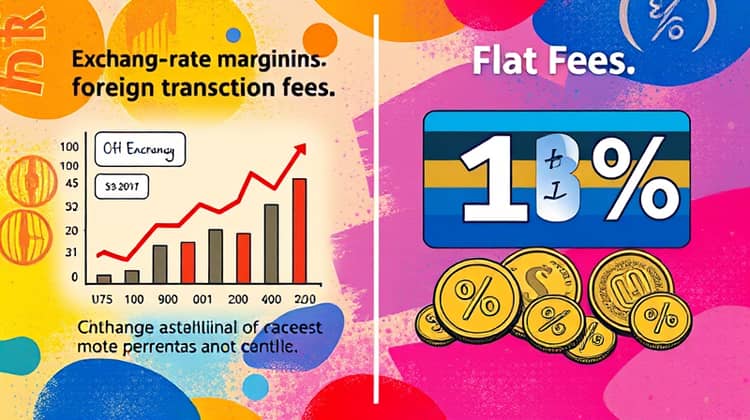In today's globalized world, traveling abroad or making purchases from international retailers has become increasingly common. However, many individuals are often surprised to discover additional charges on their credit card statements, known as foreign transaction fees. Understanding what these fees are and how they can impact your finances is crucial for anyone using their credit cards internationally.
Foreign transaction fees can add up quickly, often leading consumers to pay much more than they initially anticipated for a product or service. That's why it's essential to be aware of these charges, especially if you travel frequently or shop online with foreign vendors. This article will delve into the intricacies of foreign transaction fees, including why they exist, how they work, and how you can avoid them.
By arming yourself with the right knowledge, you can make smarter financial decisions and potentially save a substantial amount of money when using your credit cards overseas or for international transactions. Let's explore this important topic in greater detail.
What Are Foreign Transaction Fees?

Foreign transaction fees are charges imposed by credit card issuers when a cardholder conducts transactions in a foreign currency or makes purchases from international merchants. These fees typically range from 1% to 3% of the transaction amount and can be an unexpected cost for consumers who don't know about them beforehand.
When you use your credit card abroad or for an online purchase from a foreign retailer, your transaction may be subject to currency conversion as well as additional processing fees. Consequently, the credit card company may charge you a foreign transaction fee as part of the payment processing, which is added to your total bill.
While some credit cards, especially those tailored for frequent travelers, waive these fees, many standard credit cards include them as part of their terms and conditions. Therefore, understanding the specific terms of your credit card agreement is essential to avoid potential surprises.
Why Do Foreign Transaction Fees Exist?

Foreign transaction fees exist primarily to cover the costs associated with currency conversion and processing international payments. When a credit card issuer processes a transaction in a foreign currency, they often incur additional costs from external financial institutions that facilitate the conversion, leading to the imposition of these fees.
Moreover, foreign transaction fees serve as a way for credit card companies to mitigate the risks associated with international transactions, including fraud and currency fluctuations. These fees help financial institutions maintain the necessary infrastructure and security measures for processing overseas purchases.
- They help cover currency conversion costs.
- They are intended to manage risks related to international transactions.
- They provide additional revenue for credit card companies.
While it can be frustrating to encounter these fees, they are a standard aspect of international credit card transactions. Being aware of why they exist can help consumers make informed decisions regarding their credit card usage, especially when traveling.
How Foreign Transaction Fees Work

Foreign transaction fees are calculated based on the amount of your transaction. For instance, if you make a purchase of $100 in a foreign currency, and your credit card issuer charges a foreign transaction fee of 3%, you will be charged an extra $3, resulting in a total charge of $103.
The fees may be assessed not only for point-of-sale purchases abroad but also for online transactions with foreign businesses. Thus, it's crucial to be vigilant when buying from international retailers or using your credit card for services that originate outside your home country.
There might be some exceptions depending on the nature of the transaction. Certain premium credit cards may offer fee waivers or benefits for international travel, making them more appealing options for frequent travelers.
Types of Foreign Transaction Fees

Usually, foreign transaction fees fall into two main categories: exchange-rate margins and flat fees. Exchange-rate margins are included in the currency conversion process, where the rate at which the currency is converted may not reflect the market rate, effectively adding a hidden fee.
Flat fees are straightforward; they are a predetermined percentage of each transaction, typically ranging from 1% to 3%. Some credit cards may use a combination of both methods.
- Exchange-rate margins that impact the overall conversion rate.
- Flat fees based on a percentage of the transaction amount.
How to Avoid Foreign Transaction Fees

To avoid foreign transaction fees, consider using a credit card that does not impose these charges, which is ideal for travelers and those who frequently conduct international purchases.
- Research and apply for a travel rewards credit card that offers no foreign transaction fees.
- Use online payment platforms that do not charge additional fees for foreign transactions.
By proactively choosing the right financial products, you can enjoy your international transactions without incurring extra fees. Carefully review your credit card options and make sure to select those that align with your spending habits and travel needs.
Additionally, keep an eye out for promotions or special offers on credit cards that waive foreign transaction fees during certain periods, further enhancing your ability to save on unavoidable costs.
Conclusion

In conclusion, foreign transaction fees can add unforeseen costs to international purchases, but awareness and preparation can help you navigate these charges effectively. By understanding what these fees are, why they exist, and how they can impact your finances, you can make more informed decisions regarding your credit card use.
Choosing the right credit card and understanding the potential fees associated with international transactions can lead to substantial savings, allowing you to focus on enjoying your travel experiences or discovering new international products without the burden of excess fees.














